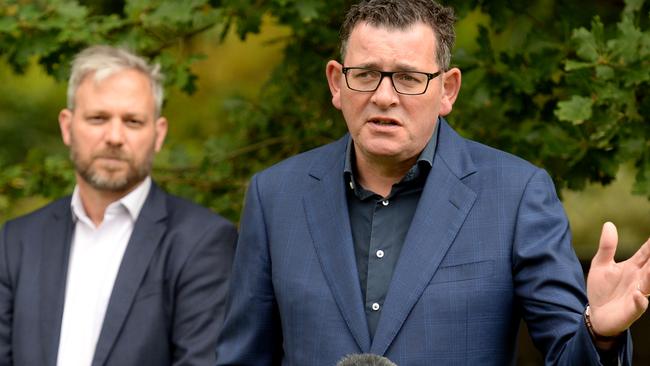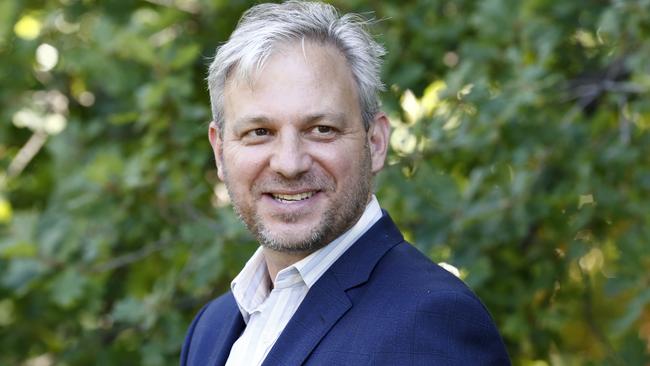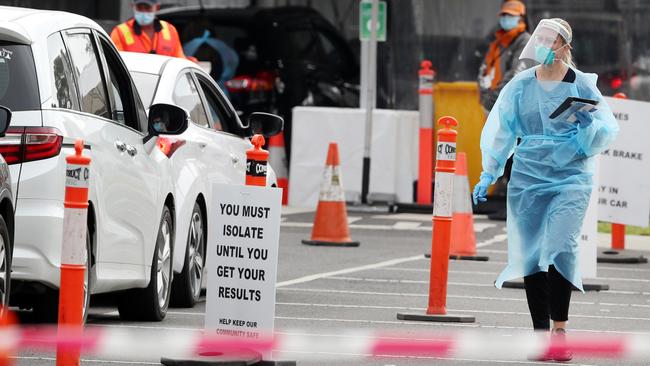State of emergency set to stay for 2021
A move to extend Victoria’s state of emergency until December has frightened hospitality workers, who fear more job losses and closures will follow.
Coronavirus
Don't miss out on the headlines from Coronavirus. Followed categories will be added to My News.
Daniel Andrews has won the support of the Greens to push his state of emergency extension legislation through parliament — a move that has shattered business owners who fear more job losses and closures.
Victorian Greens leader Samantha Ratnam said she would back the extension after the government agreed to a reduction in COVID fines for young people, a commitment to review fines given to disadvantaged communities, an appeal process for detention orders, and a confirmation of the right to protest.
The legislation to extend the Public Health and Wellbeing Amendment (State of Emergency Extension) Bill has now passed in the Upper House and the state of emergency will be extended until December.
It has already passed the Lower House.
The news has hurt business owners who feel more job losses and closures will be on the cards.
HOSPITALITY FEARS SOE EXTENSION
Renowned Melbourne restaurateur Guy Grossi who has worked in the hospitality industry for 40 years said the announcement was “frightening”.
“Having shutdowns like the one we had prior to Valentine’s Day — the amount of turnover lost and people having to go home and not work is frightening,” he said.
“I got a shiver down my back (with the SOE announcement).
“If we continue to have shutdowns there will be a lot of businesses that will not survive that.”
Mr Grossi said there’s a “chain effect” from lockdowns that will be felt far and wide.
“It’s not just business owners, it’s the butcher, the candlestick maker, the fishman, the winemaker, farmers, this thing goes for miles and it impacts an entire community.”
The Council of Small Business Organisations Australia’s chief executive officer Peter Strong said the state of emergency extension sends a clear message, “do not have any confidence, anything could happen in Victoria”.
“There could be a shutdown tomorrow,” he said.
“It means businesses can’t plan with certainty, if there’s one case the whole state could be shut down.
“It depends on what mood the government’s in, it doesn’t depend upon medical advice, it doesn’t depend on consultation.”
Mr Strong said it would hinder job creation and deter businesses from investing in Victoria.
GREENS MAKE SOE DEAL
Ms Ratnam returned from maternity leave last year to help rush through legislation increasing the total maximum for a state of emergency from six months to 12 months.
“When I came back from maternity leave last year to vote for the state of emergency extension, it wasn’t a decision I took lightly,” she said.
“At the time, the Greens recognised the ongoing need for the Chief Health Officer to make public health decisions to keep Victorians safe, but we were also concerned about the impacts these restrictions were having on disadvantaged communities.
“Public housing residents were being locked up without notice, young people were being slapped with fines they had no realistic prospect of paying, and protesters were consistently being threatened with fines or arrest.
“That’s why I haven’t taken our decision lightly this time around either. For weeks I’ve spoken with the Health Minister about our concerns, and am, today, pleased that the government has agreed to address them.
“While COVID is still a risk in the community we must continue to keep people safe, but that shouldn’t come at the expense of people’s democratic rights and rights to social justice.
“That’s why the Greens will support a nine-month extension to the state of emergency,” she said.

Leader of the Opposition in the Upper House, David Davis, said the amended legislation did nothing to limit the unprecedented powers of the government.
“Fundamentally they leave intact the extraordinary powers of Daniel Andrews and his government,” he said.
“If this is the agreement of the minor parties, it’s a sellout,” he said.
Mr Davis said while the opposition supported the introductions of a detention order appeals process, it opposed the nine-month state of emergency extension.
Instead it wants the extension to be subject to a monthly review, with any extensions by agreement of both houses of parliament.
Victoria has been in a continuous state of emergency since March 16 last year, but under current legislation cannot exceed March 16.
It gives Victoria’s Chief Health Officer extraordinary powers to do whatever is necessary to contain the spread of COVID-19 and reduce the risk to the health of Victorians.

The government was forced to rush through legislation last year increasing the maximum total period for a state of emergency from six months to 12 months.
The government faced intense backlash over its original proposal, which would have given Premier Daniel Andrew and Chief Health Officer Brett Sutton the ongoing power to impose restrictions, including to wear masks or to stay at home, without parliament’s approval until September 2021.
Meanwhile, Victoria has gone four consecutive days without recording a new COVID case. The state’s active caseload has dropped to 10.
However, an urgent coronavirus alert has been issued for three new suburbs in Melbourne’s west after fragments were found at the Werribee wastewater treatment plant.
Residents and recent visitors to Tarneit, Werribee and Hoppers Crossing have been urged to get tested even if mild COVID-19 symptoms develop after viral fragments were detected on February 25.

It comes as Victoria has used just a third of its available COVID-19 vaccines in the first week of the rollout.
National COVID-19 Coordination Commissioner Jane Halton told 3AW this morning that “everyone’s learning”.
“I do think slow and steady at the beginning is wise,” Ms Halton said.
“Everyone’s learning how to do this. We’ve never done this before.”
“I’m not at all worried by the numbers at this early stage.”
However, she said the National COVID-19 Coordination Commission was looking to see the number of vaccinations “ramp up” this week and into the following week.
Ms Halton said every state will set their own target.
“But obviously we’d like them to be using pretty much all of the vaccine that they have available to them.”
NEW HOMECOMING TIMEFRAME FOR BORDER CLOSURES
A 24-hour time frame to get home in the event of an interstate border closure has been backed by Premier Daniel Andrews, who says he has discussed the proposal with Qantas CEO Alan Joyce.
Mr Andrews on Tuesday said he had discussed the benefits of having a nationally agreed framework for allowing people to travel amid lockdowns with Mr Joyce last week.
“His commitment was to putting extra planes up in order to get people home,” he said.
“A couple of times now we’ve given people to people till midnight, maybe if we gave them 24 hours rather than a shorter time period.
“His commitment, as a business, was that they would put extra flights on.
“But they can only do the planning for that and commit to that and be accountable for that if they know they’ll get 24 hours notice across the whole country.
“For our part, I said I’m more than happy to try and do that. I want to get to that place.”
But Mr Andrews said there could be circumstances where you may not be able to provide 24 hours notice.
“If you got advice from the Chief Health Officer in any state to do not take 24 (hours), there was a need to shut within an hour or something like that, then you would no doubt follow that advice.
“But to the maximum extent practical, if we can all sign up to that 24-hour notice period, that makes sense to me.
‘But you’d always have to have that rider that if you got specific advice then you might not be able to deliver that 24 hours.”




